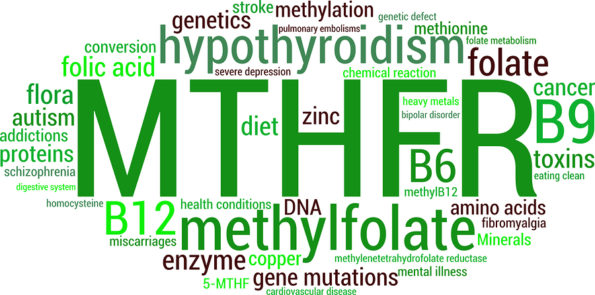MTHFR. No, it is not what you are thinking, though if you happen to have it sometimes it can feel like a pain that never wants to go away. It is linked to colon cancer, multiple miscarriages, Alzheimer’s disease, heart disease, and even depression. But before you go about worrying whether you have it or not (it is estimated that 40% of people have it) we’ll lay out the basics of what you need to know.
So, what is the MTHFR gene mutation?

MTHFR gene, short for methylenetetrahydrofolate reductase, is part of your DNA that allows your body to perform well, or not. When you consume foods with folic acid, vitamin B9, MTHFR converts these into methyl-folate.
Why is this important?

Well, the methyl-folate is essential for the process of methylation – or in adding a methyl group to a compound. It is extremely important for a high-functioning internal system.
- Regulates inflammation
- Repairs and regenerates cells, tissue and DNA
- Enhances the immune system
- Synthesizes neurotransmitters which influence sleep, memory, mood, and behavior
- Helps your liver to process fats and rid your body of heavy metals and environmental toxins
In general, those who have an MTHFR mutation are producing 30-70% less methyl-folate than someone without a gene mutation. While you cannot change your genetics, there are ways to change your diet that will keep you running at your best.
The symptoms vary from case to case, but we can point the finger at homocysteine levels that are too high when a lack of methyl-folate is unable to convert the homocysteine into methionine. From here we end up with central nervous system disorders such as post-partum depression, chronic fatigue, migraines, and fibromyalgia, along with a whole suite of cardiovascular problems: heart attack, stroke, blood clots, anemia, birth defects, and miscarriage.
![]()
If you feel it may be cause for concern, please seek medical treatment and get a diagnosis. Then begin with avoiding processed foods with synthetic folic acid and learn other ways to help your body. This means things such as dry body brushing, detox baths or the use of a sauna.
The good news is, although getting pregnant be be complicated, with the advice of your medical professional and a change in your diet, many woman the MTHFR gene mutation have started happy and healthy families.
Have you had to deal with an MTHFR diagnosis? What has helped you the most on the path to feeling well again?





